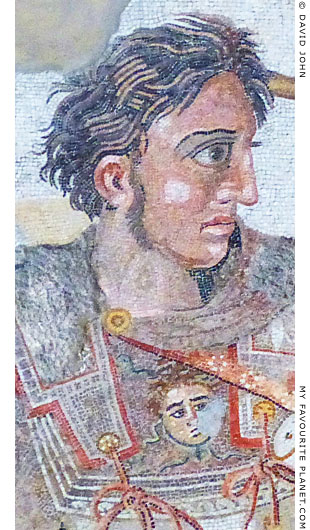|
|
|
| My Favourite Planet > English > People > Arrian of Nikomedeia |
 |
back |
Arrian of Nikomedeia |
|
|
| |
Arrian of Nikomedeia
Arrian (Ἀρριανός; Roman name, Lucius Flavius Arrianus; also referred to as Nicomediansis, of Nikomedeia; circa 86-160 AD) was a Greek historian, philosopher, military commander and politician during the reigns of emperors Trajan (98-117 AD), Hadrian (117-138 AD) and Antoninus Pius (138-161 AD). He was a native of Nikomedeia (Νικομήδεια, modern İzmit, Turkey), capital of Bithynia (Βιθυνία), northwestern Anatolia. He was an older contemporary of Herodes Atticus, Aulus Claudius Charax and Philostratus "the Athenian".
He is best known today as the author of the Anabasis of Alexander (Ἀνάβασις Ἀλεξάνδρου), a retelling of Alexander the Great's military campaigns, using now lost contemporary sources. Consisting of seven books written in the Attic dialect of ancient Greek, the work has survived almost complete, and is considered the best surviving ancient historical work on Alexander. The oldest known surviving copy was made around 1200.
Most of what is now known about Arrian is due either to references by Photius (Φώτιος Α΄, Photios I, circa 810/820 - 893 AD), Patriarch of Constantinople, in his Bibliotheka (Βιβλιοθήκη), by Suidas, or from clues within surviving texts by Arrian himself. Suidas mentioned that Cassius Dio (circa 150-235 AD), who was born and raised in Nicaea, Bithynia, [1] wrote a biography of Arrian, which has not survived. He was also mentioned or cited by other ancient authors, including Pliny the Younger (61 - circa 112 AD), who addressed seven of his epistles to him, Aulus Gellius (circa 125-180 AD), Dionysius Periegetes (2nd or 3rd century AD) and Arnobius (circa 3rd century AD). Lucian of Samosata (circa 125-180 AD) referred to him as:
"Arrian himself, disciple of Epictetus, distinguished Roman, and product of lifelong culture..." [2]
Arrian was a pupil of the Stoic philosopher Epiktetos (Ἐπίκτητος, circa 50-135 AD) around 108 AD, probably at Nikopolis in Epirus, northwest Greece. He was later dubbed the "younger Xenophon" (or the "second Xenophon"), due to the comparison drawn between his relationship with Epiktetos and that between Xenophon of Athens and Socrates. He also referred to himself by this name in his works (Kynegetikos and Periplous).
Few details are known of his career in the imperial service, but he was a friend and protegé of Hadrian (76-138 AD, around ten years older than Arrian), and it appears that he served in several parts of the empire. Around 111-114 AD he was a junior member of staff to Gaius Avidius Nigrinus, governor of Achaea province (Peloponnese). He may have subsequently served in Gaul, on the Danube frontier, and perhaps also in Baetica (Spain) and Parthia. He was raised to the senatorial class by either Trajan or Hadrian, and was suffect consul in 129 or 130 AD. From about 131 to 137 AD he was prefect or legate (governor) of Cappadocia province and commander of the legions on the frontier with Armenia.
Around the time of Hadrian's death in 138 AD, Arrian moved to Athens, where he was given citizenship, and in 145/146 AD was elected the eponymous archon of the city, an office which was by then merely honorary and without political powers. According to one modern theory, he may have retired to his hometown Nikomedeia, where he was appointed a priest of Demeter and Persephone. It is not known where or when he died. |

Alexander the Great in the "Alexander
Mosaic" from Pompeii. 200-100 BC.
For further details of the mosaic,
see the Alexander the Great page. |
| |
As with attempts to date the events of Arrian's life, no universal agreement has been reached on when or in which order he wrote his books. Although it has long been generally assumed that he wrote his works on philosophy early on, and the historical works later in life, perhaps during his second stay in Athens or while in retirement, some scholars now believe he continued writing throughout his career, and that he may have written the Anabasis of Alexander as early as 125 AD or even earlier, when he was still in this thirties. [3] Arrian's other known works include:
• Discourses of Epiktetos (Diatribai), which claims in its introduction to contain faithful transcriptions from Epiktetos' philosophical lectures. Only the first four of the original eight books are extant.
• Handbook (Encheiridion), a manual of Epiktetos' Stoic philosophy, which has survived. It remained a popular work for centuries, among Christians as well as pagans.
• Friendly conversations with Epiktetos (Ομιλίαι Έπικτήτου, Homiliai Epichtaeton) in twelve books, of which only fragments remain, was mentioned in the Bibliotheka of Photius. It has been suggested that the philosophical thoughts may have been those of Arrian himself, or even that the work is a literary fiction.
• A biography of Epiktetos, known from a mention in Simplicius' commentary on the Encheiridion.
• According to Photius, Arrian wrote biographies of the Corinthian general Timoleon and Dion of Syracuse. According to Lucian, he also wrote a biography of Tilliborus, an infamous robber of Anatolia.
• Indika (Ινδικη), describing the voyage of Nearchos, commander of Alexander's fleet, along the Persian Gulf from India, following the military campaign there. Probably written after the Anabasis of Alexander as a separate work, it was included in some manuscripts of the Anabis as an eighth book.
• Events after Alexander (Τὰ μετ᾽ Ἀλέξανδρον), a detailed account in ten books of the struggles between the Diadochi (Διάδοχοι), Alexander's successors, from the king's death in 323 BC until 319 BC. Now lost, but summarized by Photius: Photius, Bibliotheca, Codices 1-165: 92. Arrian, Continuation. Translated by J. H. Freese. At tertullian.org.
• Circumnavigation of the Black Sea (Περίπλους τοῦ Εὐξείνου Πόντου, Periplous tou Euxeinou Pontou), an account in eight books of a tour of inspection around the Black Sea coast, addressed to Emperor Hadrian. Arrian is thought to have undertaken this sea voyage around 131 or 132 AD, when he was governor of Cappadocia.
• Bithyniaka, a now lost history of Bithynia in eight books, known only from fragments. It was quoted several times by Eustathios of Thessaloniki (circa 1115-1196) in his commentaries on Homer's The Iliad and The Odyssey (see Doidalsas). The work is thought to have covered the history and legends of Arrian's homeland from ancient times until it became part of the Roman Empire.
• Parthika (Παρθικα), a history of Parthia in seventeen books, mostly concerned with the wars between the Parthians and Romans, particularly events during the reign of Emperor Trajan, which take up ten books.
• A history of the Alani (Ἀλανοί) an Iranian nomadic people of the North Caucasus.
• The hunting man (Κυνηγετικός, Kynegetikos), on hunting dogs (canes venatici), thought to have been based on a work on hunting by Xenophon.
• He also wrote a number of short works on military tactics, including The order of battle against the Alans (Τά κατ' 'Aλανονς, or Ektaxis kata Alanon, sometimes referred to as 'Aλανικη, Alaniki or Alanica) and The art of tactics (Τέχνη τακτική, Techne Taktike, circa 136/137 AD).
Arrian wrote primarily in the Attic dialect of Greek (e.g. Anabasis of Alexander), but also in Ionic dialect (e.g. Indika) and Koine Greek (common Greek, e.g. Discourses of Epiktetos). |
|
|
| |
Arrian of
Nikomedeia |
Notes, references and links |
 |
|
1. Cassius Dio
Cassius Dio (Δίων ὁ Κάσσιος, Dion o Kassios; also referred to as Dio Cassius; born circa 155-164 AD, died after 229 AD) was a Roman politician and historian from Nicaea (Νίκαια, Nikaia; today İznik, Turkey) in Bithynia, northwestern Anatolia. His father Cassius Apronianus (dates of birth and death unknown), a member of the ancient Roman family gens Cassia, served as a senator and successively as governor of Lycia and Pamphylia, then of Cilicia, as suffect consul and as governor of Dalmatia. His mother may have been Greek, and according to a disputed tradition known only from the Byzantine period, she was the daughter of the Greek orator, philosopher and historian Dio Chrysostom (Δίων Χρυσόστομος, Dion Chrysostomos, circa 40-115 AD).
Around 180 AD (or later), Cassius Dio went to Rome, and pursued a career in public service under several emperors. He became a senator under Commodus (reigned 177-192 AD), then governor (curator) of Smyrna and Pergamon, suffect consul, proconsul in Africa, governor of Dalmatia and then of Upper Pannonia. In 229 AD Severus Alexander (reigned 222-235 AD) appointed him consul for the second time, but soon after he retired to Nicaea, where some time later he died.
He was the author of a number of books, but the only surviving work is his Roman History (Ῥωμαϊκὴ ἱστορία or Ῥωμαϊκας), written in Greek, probably around 200-222 AD, chronicling the history of Rome over around 1,400 years, from the mythological tale of the arrival in Italy of the Trojan hero Aeneas (the subject of the Aeneid by Virgil, written around 29-19 BC) to 229 AD, the date of Cassius Dio's second consulship and subsequent withdrawal from public service. The work consisted of 80 books, of which some have survived intact, and others only as fragments.
2. Lucian on Arrian
Lucian of Samosata, Alexander the Oracle-Monger (Ἀλέξανδρος ἢ Ψευδόμαντις, Alexander the false prophet). The works of Lucian of Samosata, Volume 2 (of 4). Edited by H. W. Fowler and F. G. Fowler. Clarendon Press, Oxford, 1905.
3. The dating of Arrian's writings
See: Ronald Syme, The career of Arrian. In: Harvard Studies in Classical Philology, Volume 86 (1982), pages 181-211. Department of the Classics, Harvard University. At jstor.org.
|
|
|
| Photos and articles © David John, except where otherwise specified. |
 |
Visit the My Favourite Planet Group on Facebook.
Join the group, write a message or comment,
post photos and videos, start a discussion... |
|
|
| |
|
|
| |
| |
 |
| |
 |
| |
 |
| |
 |
| |
 |
| |
 |
| |
George Alvanos
rooms in
Kavala's historic Panagia District
Anthemiou 35,
Kavala, Greece
kavalarooms.gr
|
| |
Olive Garden Restaurant
Kastellorizo,
Greece
+30 22460 49 109
kastellorizo.de
|
| |
Papoutsis
Travel Agency
Kastellorizo,
Greece
+30 22460 49 286
greeklodgings.gr
|
| |
|